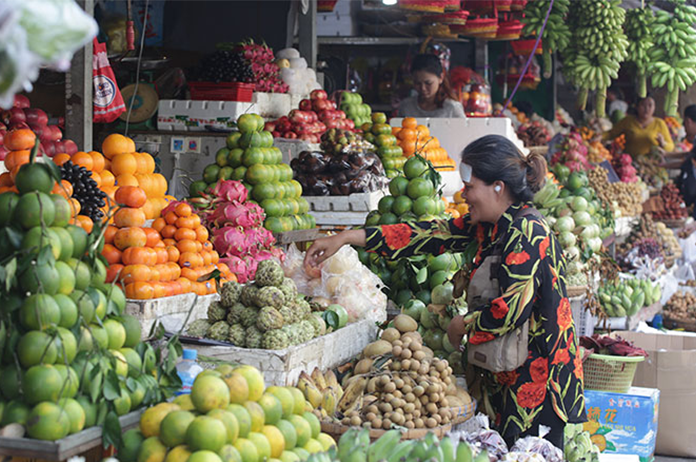Experts Call For More Export Training For Farmers And SMEs
By
B2B Cambodia
on
Boosting agricultural exports to China can only be done by improving sanitary and phyto-sanitary standards among local farmers and firms, experts concurred yesterday during a workshop organized by Germany’s GIZ.
 A Cambodian woman buys fruits at a market in Phnom Penh. KT/Mai Vireak
Farmers, exporters and public servants gathered yesterday in Phnom Penh to partake in the one-day event, which sought to find ways of bumping up Cambodian exports to China, the world’s second largest economy.
The key issues identified by the organisers were the implementation of sanitary and phyto-sanitary (SPS) standards and obtaining the certificate of origin (CO), as well as helping local firms complete other steps of the export process.
With the help of participants, three fruits were selected to centre the discussion on – banana, longan, and mango.
China has said in multiple occasions that its market is open to Cambodian agricultural products, so the Kingdom must take advantage of the opportunity to boost exports, workshop attendees noted.
Despite these remarks by Chinese authorities, Cambodia currently ships only a few agricultural products to China, namely cassava, maize, milled rice, and banana, according to the Cambodian Agriculture Ministry.
There are significant barriers to realise Cambodia’s trade potential with China, particularly the limited market knowledge of many local farmers and exporters and their inability to comply with China’s export requirements, said Ker Monthivuth, director of the plant protection and sanitary and phyto-sanitary department.
“We hope that through this workshop they will familiarise themselves with export documents, particularly those related to SPS standards,” Mr Monthivuth said.
GIZ senior advisor Claudius Bredehoft said fulfilling trade potential with the East Asian economic giant can strengthen the inclusion of Cambodian small and medium-sized enterprises (SMEs) in regional value chains.
“The Asean-China Free Trade Agreement significantly led to more economic integration in the region, but many non-tariff barriers remain.
“Especially agricultural goods, which possess huge export potential for Cambodia, offers a huge potential for Cambodian businesses working within agricultural trade,” he said.
Mr Bredehoft said GIZ’s goal is to train local farmers and firms in the use of export guidelines and procedures.
Ho Sivyong, director of the Ministry of Commerce’s export department, said, “With the Asean-China Free Trade Agreement, tariffs are no longer a problem.
“Now we have to worry about SPS compliance and securing the CO, which is now easier to do than ever because it is available online.”
In Chhayvann, president of the Kampong Speu Mango Association, shared his hopes to see Cambodian mangos in the Chinese market in the near future. He said to make this a reality his association is now beginning to use non-chemical fertilisers.
“We hope to export mangos to China, as China is one of the biggest markets and our mangos have great quality.
“By strengthening the quality of our products and procedures and avoiding chemical pesticides we hope to make this dream a reality soon,” he added.
This article was originally published in the Khmer Times.
A Cambodian woman buys fruits at a market in Phnom Penh. KT/Mai Vireak
Farmers, exporters and public servants gathered yesterday in Phnom Penh to partake in the one-day event, which sought to find ways of bumping up Cambodian exports to China, the world’s second largest economy.
The key issues identified by the organisers were the implementation of sanitary and phyto-sanitary (SPS) standards and obtaining the certificate of origin (CO), as well as helping local firms complete other steps of the export process.
With the help of participants, three fruits were selected to centre the discussion on – banana, longan, and mango.
China has said in multiple occasions that its market is open to Cambodian agricultural products, so the Kingdom must take advantage of the opportunity to boost exports, workshop attendees noted.
Despite these remarks by Chinese authorities, Cambodia currently ships only a few agricultural products to China, namely cassava, maize, milled rice, and banana, according to the Cambodian Agriculture Ministry.
There are significant barriers to realise Cambodia’s trade potential with China, particularly the limited market knowledge of many local farmers and exporters and their inability to comply with China’s export requirements, said Ker Monthivuth, director of the plant protection and sanitary and phyto-sanitary department.
“We hope that through this workshop they will familiarise themselves with export documents, particularly those related to SPS standards,” Mr Monthivuth said.
GIZ senior advisor Claudius Bredehoft said fulfilling trade potential with the East Asian economic giant can strengthen the inclusion of Cambodian small and medium-sized enterprises (SMEs) in regional value chains.
“The Asean-China Free Trade Agreement significantly led to more economic integration in the region, but many non-tariff barriers remain.
“Especially agricultural goods, which possess huge export potential for Cambodia, offers a huge potential for Cambodian businesses working within agricultural trade,” he said.
Mr Bredehoft said GIZ’s goal is to train local farmers and firms in the use of export guidelines and procedures.
Ho Sivyong, director of the Ministry of Commerce’s export department, said, “With the Asean-China Free Trade Agreement, tariffs are no longer a problem.
“Now we have to worry about SPS compliance and securing the CO, which is now easier to do than ever because it is available online.”
In Chhayvann, president of the Kampong Speu Mango Association, shared his hopes to see Cambodian mangos in the Chinese market in the near future. He said to make this a reality his association is now beginning to use non-chemical fertilisers.
“We hope to export mangos to China, as China is one of the biggest markets and our mangos have great quality.
“By strengthening the quality of our products and procedures and avoiding chemical pesticides we hope to make this dream a reality soon,” he added.
This article was originally published in the Khmer Times.